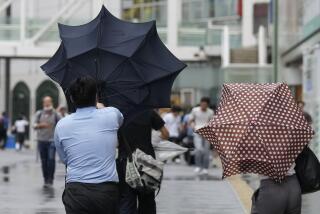Storm in Japan Goes Out to Sea; Toll at 13
- Share via
TOKYO — Typhoon Megi, downgraded to a tropical storm, swept out to sea beyond northern Japan on Friday, leaving behind an arc of destruction that killed 13 people, left thousands homeless and cut off power to more than 123,000 homes, officials said.
One of the victims was a 68-year-old man in Fujishima, on Japan’s main island of Honshu, who was killed by a street sign that was blown down by strong winds, said Tomio Ota, a police spokesman.
The storm also knocked down power lines across northern Japan, according to Tohoku Electric Power Co.
By late Friday, electricity had been restored to more than 60,000 of the households affected.
Nippon Oil Corp., Japan’s biggest refiner, stopped oil tanker shipments to its Muroran refinery on the northern island of Hokkaido, the company said.
It said that the refinery was using oil from existing stocks and that fuel deliveries were still going out by road.
Japan Airlines canceled at least 26 flights, a spokesman said, and All Nippon Airways canceled 10.
The storm was further downgraded to a tropical depression Friday as it moved out to sea off Hokkaido.
However, the Meteorological Agency said strong winds and heavy rains would last into the weekend.
Typhoon Megi first hit southwestern Japan on Tuesday, causing a string of landslides on the island of Shikoku.
Many of the storm’s victims were elderly farmers who drowned after being swept into irrigation canals by rushing water and mud.
On Thursday, 164 people -- mostly children -- were rescued by helicopters after mudslides in Shikoku cut off a road leading to a mountainside facility where they were staying.
One girl suspected of having appendicitis was airlifted to a hospital, police said. There were no injuries.
Megi killed 10 people in Japan and three in South Korea. Two other people were missing Friday in South Korea.
Megi left more than 2,400 people homeless in South Korea, said Park Min Ju, an official at the country’s disaster agency.
More than 1,200 homes in South Korea were flooded or destroyed.
Strong winds and heavy rains also hit the southern parts of North Korea, said the Korean Central Broadcasting Station, which was monitored in Tokyo.
More to Read
Sign up for Essential California
The most important California stories and recommendations in your inbox every morning.
You may occasionally receive promotional content from the Los Angeles Times.










